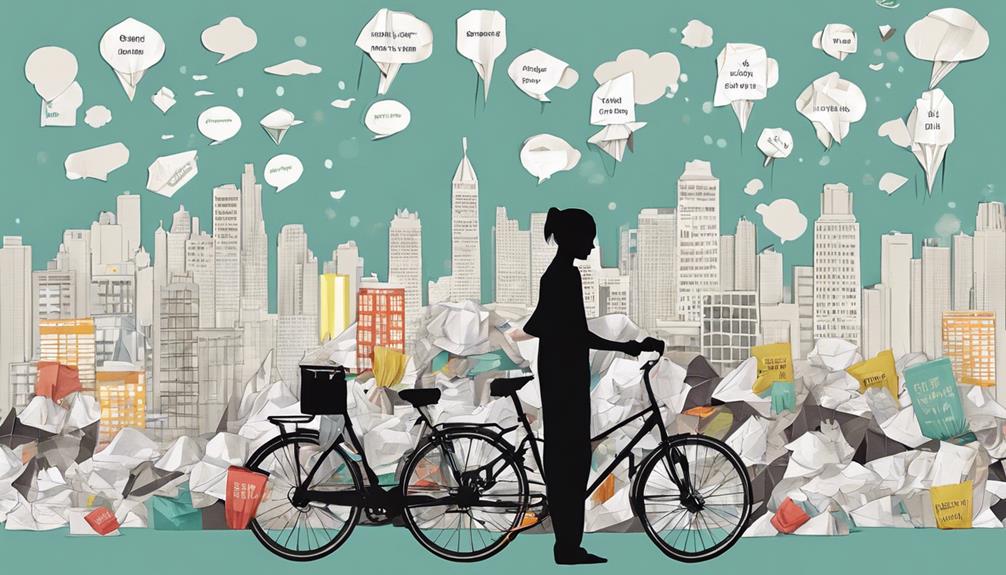You're about to discover a revolutionary shift in consumerism that's reshaping the way you live, work, and interact with others. Collaborative consumption is changing the game by redefining ownership, reducing waste, and promoting resource efficiency. Through platforms like Airbnb and Uber, you can access goods and services without the burdens of ownership. By sharing resources, you'll reduce waste, save money, and connect with others. As you explore this new era of collaboration, you'll access the power of community, sustainable living, and a mindset shift that will transform your daily life. Your journey to a more connected, sustainable you starts now.
Key Takeaways
- Collaborative consumption redefines ownership, enabling access to goods and services without the burdens of possession.
- Peer-to-peer marketplaces like Airbnb and Uber build trust between strangers, promoting a sharing economy projected to reach $335 billion by 2025.
- Community-driven platforms like Freecycle and Airbnb foster social connections, reduce waste, and promote sustainability through shared resources.
- Trust-building features, such as user reviews and verification systems, ensure security and accountability in collaborative consumption platforms.
- By adopting collaborative consumption, individuals can shift from isolation to interconnectedness, embracing a sustainable lifestyle with reduced waste and environmental impact.
Redefining Ownership in the Digital Age
As you navigate the digital landscape, you're likely to stumble upon innovative platforms that are redefining the very concept of ownership. The New York Times has reported on this shift, highlighting the rise of collaborative consumption. This new era of sharing, renting, and bartering goods and services is revolutionizing the way we think about ownership.
With the emergence of digital platforms like Airbnb and Uber, people can now access assets without the need for ownership. This shift isn't only convenient but also sustainable, as it reduces waste and promotes the efficient use of resources. Companies like Rent the Runway, which offers designer clothing rentals, are leading the charge in redefining luxury consumption.
The Rise of Peer-to-Peer Marketplaces

As you explore the rise of peer-to-peer marketplaces, you'll discover a sharing economy boom that's revolutionizing the way people live and work.
You'll learn how trust in strangers is being rebuilt, and new business models are emerging to facilitate this shift.
From Airbnb to Uber, you'll see how these platforms are changing the game and redefining the way we think about ownership and access.
Sharing Economy Boom
In just a few short years, you've witnessed the explosive growth of peer-to-peer marketplaces, which have revolutionized the way people connect, share, and monetize their resources.
The sharing economy boom has been rapidly growing, with companies like Airbnb and Etsy leading the charge. Today, Airbnb boasts over 7 million listings worldwide, a reflection of the platform's massive success. The sharing economy market is projected to reach a staggering $335 billion by 2025, highlighting the rapid expansion of peer-to-peer marketplaces.
This growth has empowered individuals to monetize their assets, from spare rooms to creative skills. Platforms like Uber and TaskRabbit have disrupted traditional industries by offering on-demand services through peer-to-peer platforms.
Trust in Strangers
You're now part of a global community that's redefined the way people connect and exchange goods and services, all thanks to the rise of peer-to-peer marketplaces. This phenomenon has enabled individuals to monetize their underutilized assets, promoting a culture of sharing and resource optimization. But what makes it all possible? The answer lies in trust in strangers.
Here are some key aspects of this trust-based system:
- Trust is fostered through user reviews and ratings, creating a reputation-based system for building confidence in collaborative exchanges.
- Platforms like Airbnb and Etsy have seen exponential growth, facilitating transactions between strangers.
- The rise of peer-to-peer marketplaces has revolutionized traditional industries, challenging conventional business models by connecting consumers directly with providers.
- The emphasis on trust in strangers has reshaped how goods and services are exchanged, emphasizing community, sustainability, and shared experiences.
- This shift has created a global community that's redefined the way people connect and exchange goods and services.
New Business Models
By leveraging trust in strangers, peer-to-peer marketplaces have given rise to innovative business models that empower individuals to monetize underutilized assets and promote sustainable consumption. You're no longer limited to traditional employment to generate income. With platforms like Airbnb and Etsy, you can turn your spare room or handmade crafts into a lucrative venture. This shift has democratized access to goods and services, fostering a sense of community and trust among users.
| Platform | Description | Benefits |
|---|---|---|
| Airbnb | Rent out spare rooms or properties | Monetize underutilized space, sustainable travel |
| Etsy | Sell handmade crafts and vintage items | Empower entrepreneurs, promote sustainable consumption |
| TaskRabbit | Offer task-based services | Generate income, promote community engagement |
| Zipcar | Share car rentals | Reduce car ownership, promote sustainable transportation |
These new business models have disrupted traditional industries, promoting collaborative consumption and sustainable living. By embracing peer-to-peer marketplaces, you can join the movement towards a more sustainable, community-driven economy.
Unlocking the Power of Community

As you tap into the collective potential of collaborative consumption, you'll discover that community-driven platforms can redefine the way you live, work, and interact with others. By fostering a culture of collaboration, individuals can access a wider range of goods and services without ownership burdens. This concept promotes social connections, trust-building, and a sense of belonging among participants.
In Wired magazine, this phenomenon was dubbed 'collaborative consumption,' emphasizing the power of community and sharing resources for mutual benefit.
To illustrate this, consider the following examples:
- Community-driven platforms like Airbnb and Freecycle exemplify how collaborative consumption can transform traditional consumption patterns.
- Shared resources reduce waste and promote sustainability.
- Social connections and trust-building foster a sense of belonging among participants.
- Access to a wider range of goods and services becomes possible without ownership burdens.
- A culture of collaboration emerges, redefining the way we live, work, and interact with others.
Sustainable Living Through Sharing

As you explore sustainable living through sharing, you'll discover the benefits of shared resource networks, which allow you to access goods and services without the need for individual ownership.
By tapping into these networks, you can make eco-friendly lifestyle choices that reduce waste and minimize your environmental impact.
Shared Resource Networks
Through shared resource networks, you can access a vast array of goods and services without the burden of ownership, enabling a more sustainable lifestyle. By sharing resources, you can reduce waste, save money, and foster a sense of community. This collaborative approach promotes a circular economy, where resources are used efficiently and responsibly.
Here are just a few examples of how shared resource networks can benefit you and the environment:
- Access to cars, bikes, or other vehicles without the need for ownership
- Shared tools and equipment for DIY projects or gardening
- Co-living spaces or shared housing for reduced living expenses
- Shared kitchen appliances or office equipment for increased efficiency
- Online platforms for borrowing or lending goods and services
Eco-Friendly Lifestyle Choices
By embracing collaborative consumption, you're taking a significant step towards a more sustainable lifestyle, reducing your ecological footprint one shared resource at a time.
By sharing resources, you're not only reducing waste but also promoting eco-friendly lifestyle choices. When you rent or share items instead of buying new ones, you lower your carbon footprint and contribute to environmental conservation.
Adopting an eco-friendly lifestyle through sharing platforms like carpooling or bike-sharing can also help decrease air pollution and traffic congestion. This mindset of conscious consumption leads to a more sustainable use of resources and a reduction in overall consumption levels.
Building Trust in Online Platforms

When you join a collaborative consumption platform, you're not just sharing goods and services – you're putting your faith in strangers, which is why building trust is paramount. Trust-building features are essential to the success of these platforms, and technology plays a significant role in establishing confidence among users.
Here are some ways online platforms establish trust:
- User reviews and ratings provide social proof and accountability
- Verification systems confirm users are who they claim to be
- Secure payment systems safeguard transactions and sensitive information
- Algorithms and data analytics detect and prevent fraudulent activities
- Transparency and accountability measures hold users responsible for their actions
This focus on trust is crucial for the collaborative consumption model to thrive, as it encourages more people to participate and engage in shared economies. Trust not only benefits individual users but also contributes to the overall sustainability and growth of these platforms.
From Isolation to Interconnectedness

As you engage with collaborative consumption platforms, you become part of a larger community that fosters connections and a sense of belonging, shifting away from the isolation of traditional consumerism. You're no longer just a solo consumer, but an interconnected member of a sharing community. This shift towards interconnectedness highlights the importance of community and collaboration in modern living.
| Traditional Consumerism | Collaborative Consumption |
|---|---|
| Isolation | Interconnectedness |
| Solo consumers | Community members |
| Limited resources | Shared resources |
| No community | Sense of belonging |
| Environmental waste | Sustainable living |
Through platforms like Airbnb and TaskRabbit, you can forge meaningful connections with others and create a more sustainable lifestyle. Collaborative consumption encourages you to share experiences and resources, breaking down the barriers of isolation and fostering a sense of community. As you participate in this new economy, you'll find that the benefits extend far beyond just saving money – you'll be building a more connected, more sustainable world.
The Economic Benefits of Sharing

How do you benefit financially from sharing your assets and resources with others? By participating in collaborative consumption, you can reap several economic benefits. Here are a few ways you can profit:
- Increased income: Rent out your underutilized assets, such as a spare room on Airbnb or your car on Turo, to generate a new revenue stream.
- Cost savings: Share goods and services with others to reduce your expenses, like splitting the cost of a lawn mower with your neighbor.
- Reduced waste: Collaborative consumption encourages a shift towards access over ownership, reducing the need for excessive purchasing and promoting resource efficiency.
- New economic opportunities: Sharing economy platforms like Uber and Lyft have created new ways for individuals to monetize their skills and assets.
- Sustainable economy: By promoting the sharing of resources, collaborative consumption contributes to a more sustainable economy, reducing waste and promoting eco-friendliness.
Rethinking Consumerism and Waste

By embracing collaborative consumption, you're contributing to a significant reduction in waste and overconsumption, and helping to redefine the way we think about consumerism.
Traditional consumerism promotes individual ownership, leading to a culture of waste and excess production. However, collaborative consumption encourages a shift from ownership to access, reducing the need for unnecessary goods. This shift has a direct impact on the environment, minimizing waste and promoting sustainability.
Platforms like Airbnb and Rent the Runway enable you to access what you need without contributing to excessive waste. Rethinking consumerism through collaborative consumption leads to a more efficient use of resources and a reduction in landfill waste.
Embracing a New Era of Collaboration

You're stepping into a new era of collaboration where sharing resources, reducing waste, and building stronger communities become the norm. This shift is driven by a desire for meaningful connections, cost savings, and environmental sustainability. As Roo Rogers, a pioneer in collaborative consumption, would agree, this new era is all about rethinking ownership and embracing access.
Here are a few ways you'll benefit from this new era of collaboration:
- Access to a wider range of goods and services: Collaborative consumption allows you to access what you need without the burden of ownership.
- Reduced waste and environmental impact: By sharing resources, you'll contribute less to landfills and reduce your carbon footprint.
- Stronger, more meaningful connections: Collaborative consumption fosters a sense of community and reciprocity.
- Cost savings: Sharing resources often means splitting costs, saving you money in the long run.
- A mindset shift towards sustainability: This new era of collaboration promotes a culture of sharing, reducing the emphasis on individual ownership and waste.
Frequently Asked Questions
What Are the 4 Key Drivers of Collaborative Consumption?
You're wondering what drives collaborative consumption? Well, you'll find that it's fueled by a renewed belief in community, environmental concerns, technology, and a desire for meaningful connections – these four key drivers are changing the way you live.
What Is the Concept of Collaborative Consumption?
You're about to discover the concept of collaborative consumption, where you'll share, swap, or rent goods and services with others, fostering a community-driven economy that's more environmentally friendly and socially responsible.
Which Practices Are Considered Collaborative Consumption?
You'll find that practices like renting homes on Airbnb, sharing items on Rent the Runway, car-sharing with Zipcar, and even bartering on Bunz Trading Zone are all considered collaborative consumption.
What Is an Example of a Collaborative Economy?
"A million opportunities await you in the collaborative economy! For instance, you can monetize your spare room on Airbnb, or rent out your car on Turo when you're not using it – the possibilities are endless!"
How Does Collaborative Consumption Contribute to Privacy and Security in AI?
Collaborative consumption is part of the apple ondevice openelm revolution, promoting privacy and security in AI. By sharing resources, individuals can reduce data exposure and potential security risks. This movement fosters a more secure AI environment by minimizing the need for personally identifiable information and protecting user privacy.
Conclusion
You're about to discover a treasure trove of benefits by embracing collaborative consumption!
By sharing resources, you'll not only reduce waste and live more sustainably, but you'll also tap into a sense of community and connection that's invaluable.
Imagine having access to everything you need without the burden of ownership – it's like having a million dollars' worth of resources at your fingertips!
So, get ready to rethink consumerism and join the sharing revolution that's changing the way we live.









